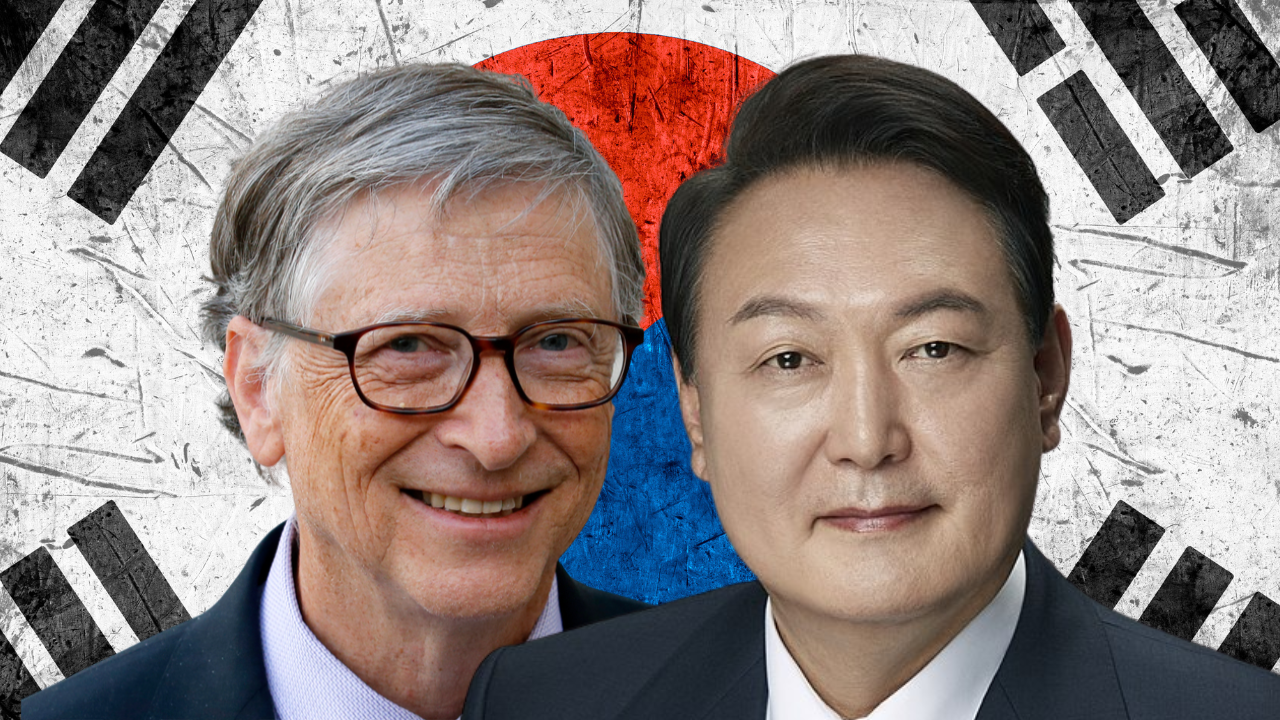Bill Gates, vaccine advocate, farmer, and nuclear reactor businessman, will meet South Korea’s President Yoon Suk-yeol to discuss vaccines, global health, and future pandemics.
Bill Gates and South Korea
Bill Gates will visit Seoul, South Korea for several days from August 15th to 17th, and plans to meet with President Yoon Suk-yeol after he addresses the National Assembly on Wednesday.
Gates will meet with other key South Korean business leaders like Speaker Kim Jin-pyo, and will give a speech on “The importance of international cooperation and Korea’s leadership for coping with and preparing for COVID-19 and future infectious diseases” at the plenary session of the Special Committee on Budget and Settlement of the National Assembly.
This meeting is mere days after South Korea’s SK Inc. said Monday, August 14th, it will invest $250 million in TerraPower, a nuclear innovation company founded by Gates that develops small-sized nuclear power reactors.
SK Group also owns chipmaker SK Hynix, which will be building a chip-making facility in the US next year. More details are below.
As reported by Reuters, “SK Inc, the holding company of South Korea’s second-largest conglomerate SK Group, said it made the investment with affiliate SK Innovation (096770.KS) as part of a total $750 million fundraising round co-led by Gates.”
According to TerraPower’s CEO, Chris Levesque, no other nuclear company has achieved investments of this magnitude with as much continued interest from the financial community. There are currently 800 engineers working on TerraPowers nuclear reactor “right now.” Levesque confirmed their support from the federal government’s Department of Energy, which will cover half of the inaugural Natrium projects’ costs, pointing out how much of a “dream team” they are together.
The Natrium project is the main nuclear design project within TerraPower.
South Korea’s Semiconductor Ties
South Korea’s newly appointed National Assembly speaker Kim Jin-pyo, 75, met with a delegation from the US House of Representatives on July 6th and discussed issues like work visas, human rights, inter-country adoptee citizenship, and the increasingly popular semiconductors. The meeting was held in South Korea’s National Assembly meeting room.
According to the Korea Assembly website, “Speaker Kim hopes ‘Korean investors in the US will benefit from the CHIPS Act’. From the US side, Reps. Ami Bera, Young Kim, Scott Peters, Ed Case, Mark Green, Jennifer Wexton, Kathy Manning, and Mariannette Miller-Meeks participated in the meeting.”
Biden signed the CHIPS and Science Act on August 9th which will appropriate $52 billion in chip manufacturing and research subsidies.
According to Aljazeera, South Korea’s SK Hynix plans to select a US site for an advanced chip packaging plant and will break ground in the first quarter of 2023. The SK Group, South Korea’s second-biggest conglomerate, owns memory chipmaker SK Hynix. The new plant will be part of a $22 billion US-based investment package in semiconductors, green energy, and bioscience projects.
The SK Group is invested in semiconductors with the US government, and in nuclear power with Bill Gates, which is also partially funded by the US government.
Gates’ Nuclear Power
An article by Business Wire points out, “Moohwan Kim, Executive Vice President and Head of Green Investment Center at SK Inc. noted that “SK is excited to expand our energy, technology and bioscience investments with leading companies in the US. We are committed to supporting TerraPower’s global deployment of game changing products. We see important synergies in our businesses and this investment reinforces our strategic global carbon reduction goals.”
The DOE plans to invest nearly $2 billion to support the licensing, construction, and demonstration of this first-of-a-kind nuclear reactor by 2028.
Editors Note: At the start of the pandemic, Bill Gates began playing the role of a representative and kind of a “political leader” on behalf of the United States. However, he was not appointed nor elected by the US citizens to take on this “role.” His track record of vaccine management and now nuclear and farmland management leaves a question mark on his long-term intentions with the world and, in part, his collaboration with the US government. This is why we have a separate category for Bill Gates.
Read More: Why Everyone Should Know About The CHIPS Act
Get the news you need at It’s On News.


